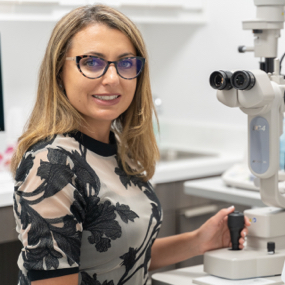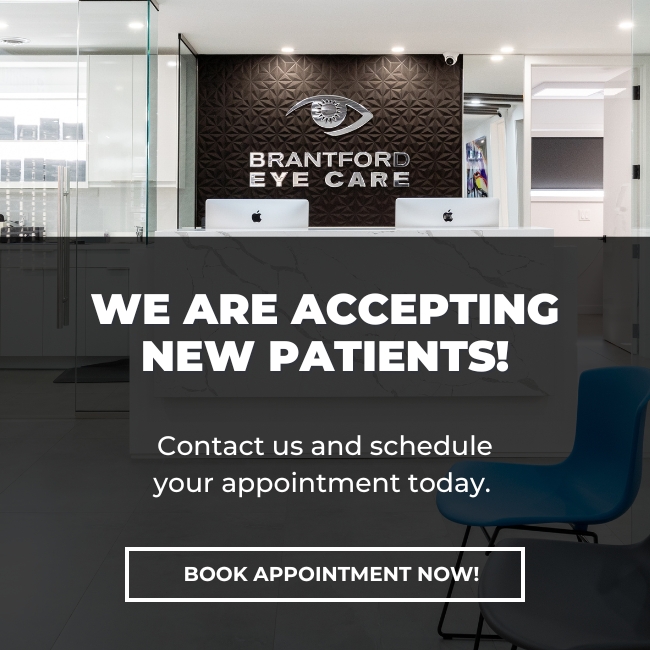There used to be a time when we didn’t understand the effects that hitting your head could have. However, that’s no longer the case. We now know that concussions can cause a wide range of symptoms and effects.
The effects of a concussion can go beyond headaches and dizziness too. A concussion can affect how your brain and eyes communicate, leading to vision challenges. While some may think of optometrists as resources for vision exams and eye disease management, we can also help with the after-effects of a traumatic brain injury (TBI).
There are 200,000 concussions reported in Canada each year! Many of those concussions are from kids as they play sports, and it’s something you may think about while watching them on the field or rink. Fortunately, with vision therapy, our eye care team can help support you or your child throughout the TBI recovery process.

Understanding Concussions
Concussions can occur when the brain experiences a sudden jolt or impact, causing it to move rapidly within the skull. Common causes of concussions include sports-related injuries, falls, motor vehicle accidents, and even certain workplace incidents. No concussion should be taken lightly, regardless of the severity.
Unfortunately, a doctor can’t see a concussion on routine MRIs, X-rays, or CT scans. That’s why it’s important to watch for the signs of a concussion when you or someone you know experiences a head injury.
After a concussion, people may experience a range of symptoms, usually split into 4 categories: physical, mental, emotional, and sleep-related.
The full range of concussion symptoms can include:
- Headaches
- Dizziness
- A feeling of pressure in the head
- Light sensitivity
- Noise sensitivity
- Blurry vision
- Nausea
- Confusion
- Tiredness or sleepiness
- Memory problems
- Heightened emotions, such as sadness or irritability
- Anxiety
- Changes in sleep patterns
Many people recover from a concussion in 10 days to 4 weeks, but younger individuals could take longer to recover. If you suspect you or someone else might have a concussion, it’s important to visit a doctor. This is true even if you don’t lose consciousness.
If you notice any of the following severe symptoms, seek medical attention immediately:
- Loss of consciousness
- Seizures or convulsions
- Repeated vomiting
- Neck pain
- Tingling, burning, or lingering weakness in arms or legs
- Double vision
- A headache that is getting worse or becomes severe
The Brain–Eye Connection
Your vision is about more than how your eyes work. In fact, our visual system is a remarkable and intricate network that connects the eyes, optic nerves, and brain. It plays a crucial role in our daily lives, helping us navigate the world around us. Any disruption to this system, such as a concussion, can have profound effects on your vision, even if your eyes are healthy.
Because of this close connection, you may notice effects on your vision long after a head injury has seemingly healed due to post-trauma vision syndrome.
What Can Post-Trauma Vision Syndrome Affect?
Depending on where the damage is focused, concussions and general trauma can affect your eyes in multiple ways. The visual skills post-trauma vision syndrome can affect include:
- Eye coordination: Concussions can impair the smooth tracking of moving objects or cause difficulties with focusing on near and far objects.
- Focusing: Blurred or double vision is a common complaint after a concussion.
- Visual processing: Visual information processing, including depth perception, can be disrupted, leading to challenges with recognizing shapes, faces, or even reading.
- Pupil control: Some individuals with concussions can become highly sensitive to light or experience discomfort in brightly lit environments.
Issues with these skills could result in common visual challenges, such as:
- Diplopia (double vision)
- Trouble following moving objects
- Slow reading
- Inability to focus
- Eyes coming out of alignment
- Light sensitivity (photophobia)
- Trouble moving your gaze between points
- Difficulty maintaining eye contact
Convergence insufficiency (CI) is one of the most common vision issues following a concussion. CI is a condition that can affect how your eyes work together when looking at something up close, such as while you’re reading or on your phone. While it often affects people during childhood, it can occur after a concussion as well.
An Optometrist’s Role in TBI Recovery
If you’ve experienced a concussion and are struggling with any vision-related symptoms, your doctor might recommend you seek professional help from an optometrist. When you visit us for vision therapy, we can perform a comprehensive evaluation to assess the effects a concussion may be having on your vision.
Using precise diagnostic technology, we can examine your symptoms to determine how you may be able to benefit from vision therapy. This can include testing your visual acuity, the smoothness of your eye movements, and looking for misalignments. We can then recommend appropriate treatment options with an individualized vision therapy plan.
Your Vision Therapy Treatment Plan
Just like how concussions affect each person differently, there isn’t simply one treatment for every patient. In general, the goal of vision therapy is to help strengthen the mind-brain connection and help people regain the coordination their visual system needs.
Your trained vision therapist will develop a plan to address your specific needs. This could include rehabilitation sessions, where your therapist will take you through exercises you can continue at home to retrain your eyes. Your vision therapy plan could also include the use of glasses with specific lenses that can help address visual challenges you may be experiencing.
Throughout the process, we can regularly evaluate your visual skills to confirm the program is working as intended and make adjustments as needed.
Vision Therapy for Kids & Adults
Every day we’re learning more and more about how the brain works and, moreover, how it can affect your vision.
You don’t have to navigate the TBI recovery process alone. If you or a family member has experienced a concussion and is struggling with vision-related symptoms, don’t hesitate to reach out to us at Brantford Eye Care.
With the help of a skilled optometrist and the power of vision therapy, you can take the first step in overcoming the challenges of concussion-related vision problems. Your vision matters, and we’re here to support you every step of the way.
Book an appointment to speak with us about your options for vision therapy.




